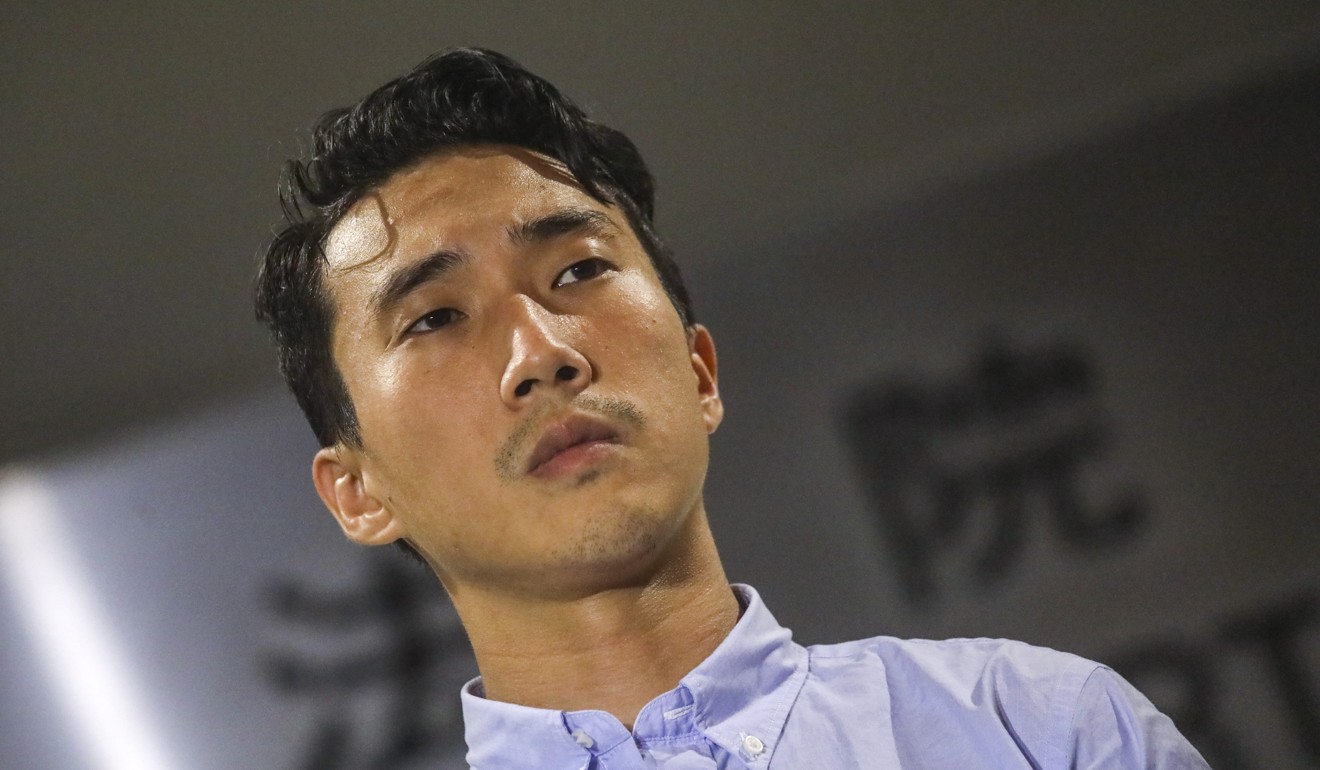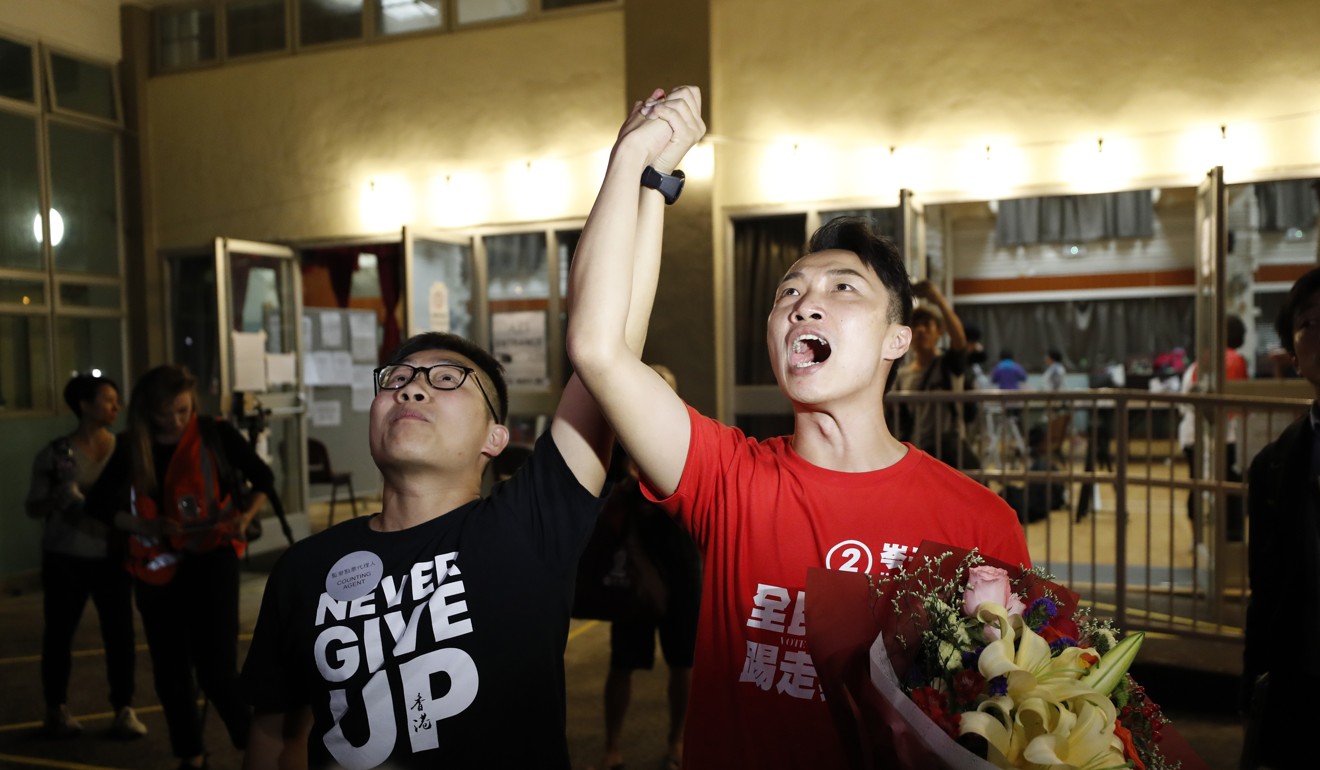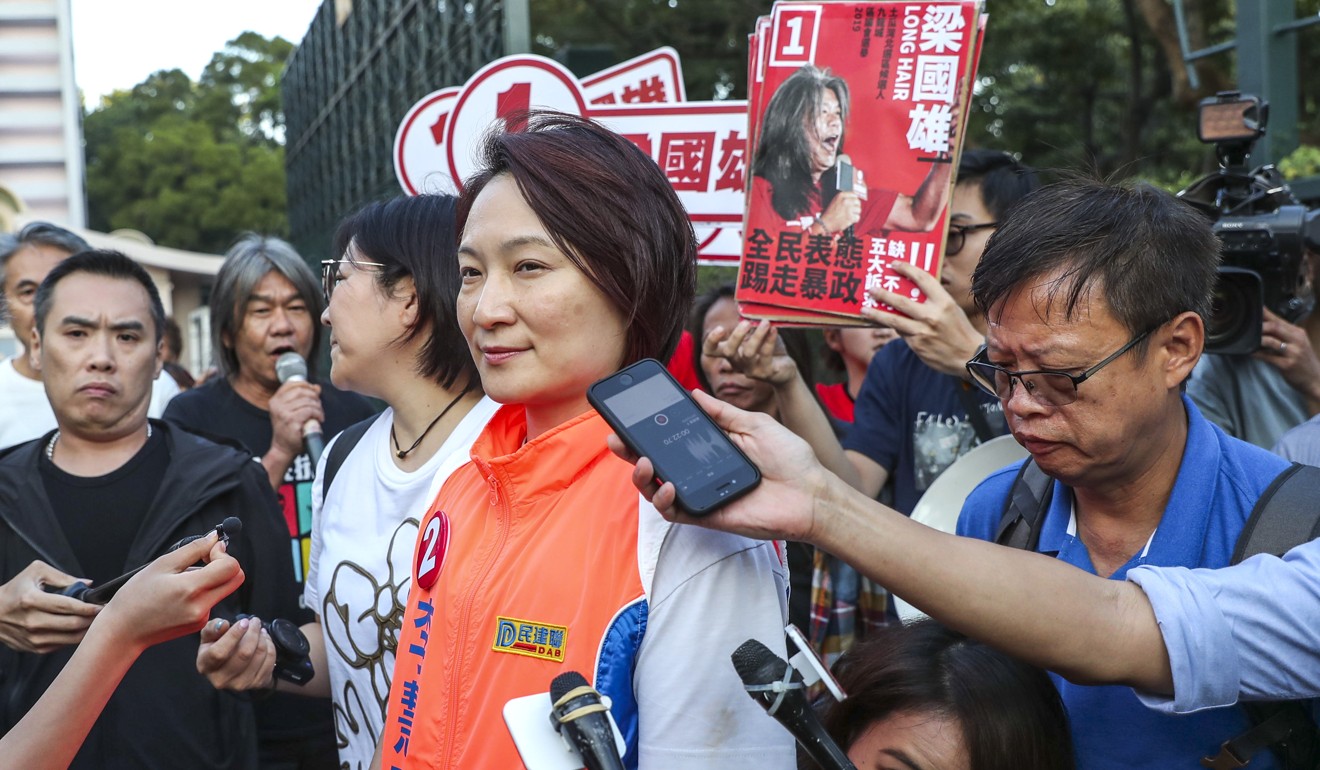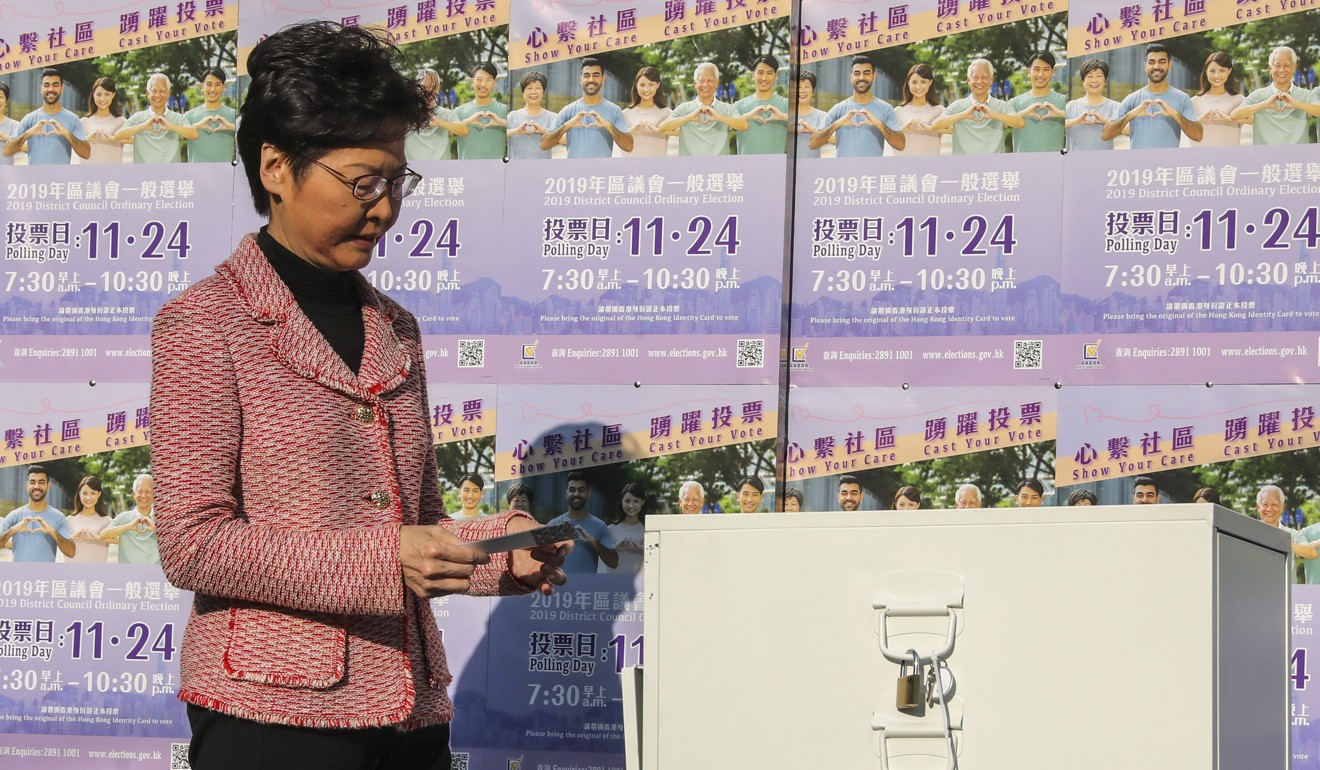Hong Kong election takeaways: has pan-democrat domination made them kingmakers in race to succeed Carrie Lam as chief executive?
- Pro-establishment bloc licks wounds as its rivals seek to capitalise in long term on district council takeover
- Power struggle will see pro-democracy bloc try to wrest control from government to district councils, academic predicts

In a thundering rebuke to the city’s government, Hongkongers – or 71.2 per cent of voters – turned out in record numbers for the city’s district council elections on Sunday to deliver a seismic victory for the pro-democracy bloc.
The democrats won majorities in at least 17 of the 18 district councils, as they pummeled their pro-Beijing rivals, who lost more than 250 seats from 2015.
The citywide elections were regarded as a de facto referendum on the city’s protests, which have rocked the city since June, as well as the government’s response. Here are the six key takeaways from the polls:
1. Tectonic shift in political landscape
Hong Kong’s pro-democracy bloc swept up almost 80 per cent of the 452 seats up for grabs in Sunday’s district council elections.
Riding on the anti-establishment momentum built up by over nearly six months of unrest, democrats scored victories, not only in their usual strongholds, but also the so-called “deep red” constituencies, which for years have been dominated by the Beijing-friendly camp.
That includes constituencies formerly held by members of rural powerhouse Heung Yee Kuk, such as Lam Tsuen Valley in Tai Po and Shap Pat Heung West in Yuen Long.
Political scientist Dr Ma Ngok, of Chinese University, described the results as “surreal”.
“Hongkongers have sent a resounding and clear message to the government that they support the social movement and there isn’t any change of public opinion,” he said, referring to the increasingly violent protests over the past weeks.
Civil Human Rights Front convenor Jimmy Sham Tsz-kit, who won in Lek Yuen constituency, urged Hong Kong leader Carrie Lam Cheng Yuet-ngor to listen to the voice of the people.
The government continued to be dismissive of public opinion showcased in massive rallies and opinion polls, he said, warning it must not now shy away from the clear message from these elections.
“It is time for the government to address our five demands,” said Sham, referring to protesters’ calls, which include an independent probe into police’s handling of protests and the implementation of universal suffrage.
2. Occupy leaders, key players of protest movement win big
At least three student leaders, who co-led the pro-democracy Occupy movement in 2014, were successfully returned as district councillors in their maiden electoral bids.
Former deputy secretary-general of Hong Kong Federation of Students (HKFS) Lester Shum, one of the five students involved in talks with government officials over the protests five years ago, bagged 5,113 votes in Tsuen Wan’s Hoi Bun constituency, unseating the incumbent councillor Chow Ping-tim, who served the area for seven terms but received only 1,974 votes on Sunday.

Tommy Cheung Sau-yin, 25, who was ordered to complete 200 hours of community service after being found guilty for his role in Occupy earlier this year, beat the pro-establishment incumbent Wilson Wong Wai-shun in Yuen Lung constituency in Yuen Long.
Eddie Chan Shu-fai, former secretary-general of HKFS and former president of Lingnan University’s student union, won in Hung Fuk constituency, also in Yuen Long. Both Shum and Chan joined pro-democracy and environmentalist lawmaker Eddie Chu Hoi-dick’s team after graduating from university.
Two victims of police brutality during the Occupy movement are also among the newly elected. They are Ken Tsang Kin-chiu, who was assaulted by seven policemen, and Osman Cheng Chung-hang, who was hit by the baton of retired senior police officer Frankly Chu.
In his victory speech, 26-year old Shum said the pro-democracy camp must not rest on its laurels.
“The results showed that many voters have wanted to show their support to the movement and the five key demands we have, as well as their dissatisfaction with the government,” he said.
“We could be happy for tonight and take a rest tomorrow, but we would need to keep up our fight the day after to fight for the future of Hong Kong.”
3. Will pan-democrats repeat history by squandering surge?
The scenes on Sunday night gave the pro-democracy camp a sense of déjà vu.
In 2003, the bloc also secured a landslide victory after 500,000 people took to the streets to oppose proposals to bring in national security laws under Article 23 of the Basic Law.

But the honeymoon period did not last long as the Beijing-friendly camp soon made a strong comeback in the 2007 polls, regaining most of the seats it lost following a vigorous shake-up of leadership and the allocation of more financial resources.
Some pan-democrats who failed to secure a second term were blamed for focusing solely on political slogans and not putting enough effort into community work.
On Sunday, the camp appeared to be well aware of past mistakes.
Both Jimmy Sham and Tommy Cheung called on their allies to give their all throughout the four-year terms they secured.
“We need to demonstrate that the supporters of democracy are more outstanding than those who support the establishment,” Sham said.
Dr Ma Ngok said he did not think mistakes would be repeated by the pro-democracy side. He noted most of the newcomers were young, and he believed they would be committed councillors.
But Ma said the camp should take the precious opportunity to fight for systematic reform so councillors could enjoy more power and greater autonomy in making decisions.
“It is going to be a constant struggle with the government.” Ma said.
4. Conducting the postmortem: how will pro-establishment recover from heavy losses?
The Beijing-friendly camp suffered heavy losses in the polls by losing at least 241 seats from 2015.
In a disastrous performance, the city’s largest pro-establishment party, Democratic Alliance for the Betterment and Progress of Hong Kong (DAB), only managed to secure 21 seats despite fielding 181 candidates.
Nine of the 13 pro-Beijing lawmakers who sought re-election at district councils were defeated, with many losing by large margins.
Federation of Trade Unions’ Luk Chung-hung failed to secure another term in Tin Heng after losing to pro-democracy candidate Wong Pak-yu by 2,273 votes.

FTU’s Alice Mak Mei-kuen, who has been a district councillor for more than two decades, and DAB’s Holden Chow Ho-ding were beaten by 1,714 and 1,430 votes respectively.
The four who secured a second term by razor-thin margins were Starry Lee Wai-king and Wilson Or Chong-shing, both of DAB, FTU’s Aron Kwok Wai-keung and independent Paul Tse Wai-chun.
The landslide results are set to drag the camp’s performance down in the next Legislative Council elections in 2020.
Chow’s setback was particularly significant as he is one of five “super district councillors”, who are lawmakers returned from the district council constituency of the legislature.
The defeat has disrupted his party’s plan in the next Legco election next year as Chow will no longer be able to run through the same constituency in 2020.
DAB is now also limited to fielding one “super seat” candidate in the next election.
5. Next big prize: what impact will this have on the 2022 race to be Hong Kong leader?
The massive gains by the pan-democrats will translate most significantly in the choice of Hong Kong’s future leader.
Since the pro-democracy side holds power in the overwhelming majority of district councils, it is set to enjoy a bigger say in the next chief executive election in three years.

Sunday’s result means it will be able to obtain about 117 seats in the 1,200-strong Election Committee that selects the city’s leader.
Now that they have control of the district councils, it would be a safe bet to say pan-democrats have those committee seats in the bag.
This is not an insubstantial figure when added to the 325 other seats they typically control. It could make the pan-democrats the kingmakers in the next election for Hong Kong’s leader.
6. Fight or flight: what happens now to the protests?
The remarkable victory of the pro-democracy bloc begs a key question: will it heat up or defuse the months-long protests?
The anti-government demonstrations have grown increasingly violent in recent weeks and have shown little sign of abating, although there was relative calm in the immediate run-up to the elections.
Political scientist Dr Ma Ngok said the election results had definitely given the social movement a strong boost, especially on the international stage. He said the polls were considered abroad a “total electoral victory” in what was widely seen as a proxy referendum on the protests.
He also pointed out that polling day was peaceful, marking a stark difference to previous weekends, when violent clashes between protesters and police took hold of the city.
“The government can no longer govern if it still refuses to listen to the people’s calls,” he said, warning it had already lost its legitimacy in both the district and legislative councils.
Ma said the government had in the past always claimed its unpopular proposals had received the majority support from Hongkongers after securing the backing from the heads of the 18 district councils. That will no longer be available.
On Reddit-like site LIHKG – the virtual command centre of the largely faceless protest movement – online users have been floating the idea of holding a massive march on Sunday.
“We need to tell people that we are still unsatisfied [with the government’s response] and the district council polls are just one of our battlefields,” one wrote.
Others also said that with the landslide victory, they should give the government an ultimatum and warned of escalating their actions on Sunday if their demands were not met by Saturday.